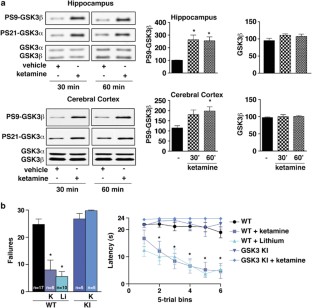Inhibition of glycogen synthase kinase-3 is necessary for the rapid antidepressant effect of ketamine in mice (original) (raw)
- Letter to the Editor
- Published: 19 April 2011
Molecular Psychiatry volume 16, pages 1068–1070 (2011)Cite this article
- 2980 Accesses
- 11 Altmetric
- Metrics details
Subjects
This study found that (a) administration of a relatively low dose of ketamine to mice inhibits brain glycogen synthase kinase-3 (GSK3), (b) this inhibition of GSK3 is necessary for rapid antidepressant-like effect of ketamine in the mouse model of learned helplessness because mice expressing constitutively active GSK3 are completely resistant to the antidepressant-like effect of ketamine, and (c) administration of a dose of the GSK3 inhibitor lithium much higher than usually used produces a rapid antidepressant-like effect equivalent to ketamine. This demonstrates that inhibition of GSK3 is required for rapid antidepressant effect of ketamine in this model and raises the possibility that acute administration of specific GSK3 inhibitors may be sufficient to produce rapid antidepressant effects similar to ketamine.
Ketamine administration can produce rapid antidepressant effects in patients with major depression and relieve treatment-resistant depression.1, 2 These actions likely arise from ketamine's antagonism of glutamatergic _N_-methyl-D-aspartate (NMDA) receptors, as well as from additional mechanisms that have been suggested.3, 4, 5 We previously found that memantine, another NMDA antagonist, caused rapid inhibition of glycogen synthase kinase-3 (GSK3) in mouse brain,6 which raised the possibility that ketamine may have a similar action. This is relevant because much evidence links inadequate inhibition of GSK3 to major depressive disorder and bipolar disorder.7 Here, we report that ketamine rapidly inhibits GSK3 in mouse brain, and the rapid antidepressant effect of ketamine in the learned helplessness model of depression-like behavior requires inhibition of GSK3 and is mimicked by acute high-dose administration of the GSK3 inhibitor lithium.
This is a preview of subscription content, access via your institution
Access options
Subscribe to this journal
Receive 12 print issues and online access
$259.00 per year
only $21.58 per issue
Buy this article
- Purchase on SpringerLink
- Instant access to full article PDF
Prices may be subject to local taxes which are calculated during checkout
Additional access options:
Figure 1

References
- Berman RM, Cappiello A, Anand A, Oren DA, Heninger GR, Charney DS et al. Biol Psychiatry 2000; 47: 351–354.
Article CAS Google Scholar - Zarate Jr CA, Singh JB, Carlson PJ, Brutsche NE, Ameli R, Luckenbaugh DA et al. Arch Gen Psychiatry 2006; 63: 856–864.
Article CAS Google Scholar - Li N, Lee B, Liu RJ, Banasr M, Dwyer JM, Iwata M et al. Science 2010; 329: 959–964.
Article CAS Google Scholar - Maeng S, Zarate Jr CA, Du J, Schloesser RJ, McCammon J, Chen G et al. Biol Psychiatry 2008; 63: 349–352.
Article CAS Google Scholar - Machado-Vieira R, Salvadore G, Diazgranados N, Zarate Jr CA . Pharmacol Ther 2009; 123: 143–150.
Article CAS Google Scholar - De Sarno P, Bijur GN, Zmijewska AA, Li X, Jope RS . Neurobiol Aging 2006; 27: 413–422.
Article CAS Google Scholar - Li X, Jope RS . Neuropsychopharmacol 2010; 35: 2143–2154.
Article CAS Google Scholar - Jope RS, Johnson GV . Trends Biochem Sci 2004; 29: 95–102.
Article CAS Google Scholar - McManus EJ, Sakamoto K, Armit LJ, Ronaldson L, Shpiro N, Marquez R et al. EMBO J 2005; 24: 1571–1583.
Article CAS Google Scholar - Klein PS, Melton DA . Proc Natl Acad Sci USA 1996; 93: 8455–8459.
Article CAS Google Scholar
Author information
Authors and Affiliations
- Department of Psychiatry and Behavioral Neurobiology, University of Alabama at Birmingham, Birmingham, AL, USA
E Beurel, L Song & R S Jope
Authors
- E Beurel
You can also search for this author inPubMed Google Scholar - L Song
You can also search for this author inPubMed Google Scholar - R S Jope
You can also search for this author inPubMed Google Scholar
Corresponding author
Correspondence toR S Jope.
Ethics declarations
Competing interests
The authors declare no conflict of interest.
PowerPoint slides
Rights and permissions
About this article
Cite this article
Beurel, E., Song, L. & Jope, R. Inhibition of glycogen synthase kinase-3 is necessary for the rapid antidepressant effect of ketamine in mice.Mol Psychiatry 16, 1068–1070 (2011). https://doi.org/10.1038/mp.2011.47
- Published: 19 April 2011
- Issue Date: November 2011
- DOI: https://doi.org/10.1038/mp.2011.47